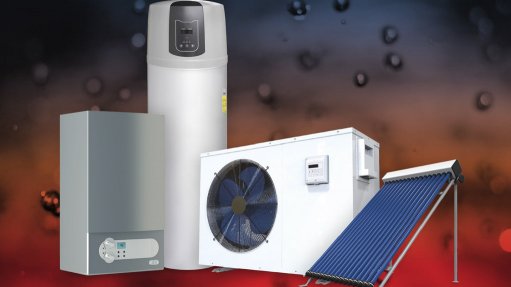
BIG PLANS HydraTherm has upcoming ranges of energy efficient water heating solutions in the gas and solar water sectors for 2018
With the South African heat pumps market experiencing a high-growth phase, driven by the cost of energy, energy efficiency requirements for buildings, and overall cost and performance efficiency of the technology used, water heating solutions company HydraTherm has responded to the trend of wider use of integrated heat pumps, with the company’s brand becoming the first in South Africa to introduce a South African National Standard (SANS) 151-compliant 150 ℓ integrated heat pump model.
“Previously, the smallest approved models were between 175 ℓ and 200 ℓ, and the inclusion of the 150 ℓ model has seen a dramatic increase in the demand for integrated heat pumps in South Africa,” says HydraTherm MD Llewellyn Ward.
An integrated heat pump, as defined by HydraTherm, comprises a hot water cylinder (geyser) with an energy efficient heat pump, as opposed to a conventional electric element, as its heating source. The heat pump is mounted on top of the water tank, and heats the water by moving heat from the surrounding air to the water, by means of a compressor and an air-to-water heat exchanger.
Changing from a conventional geyser to a heat pump saves up to 70% of total hot water costs, which can sometimes account for up to 60% of a domestic electricity bill. Not only are costs cut, but the integrated heat pump is simple to operate, with installation similar to that of an ordinary geyser.
In addition, noise is significantly reduced with the integrated heat pump, with the centrifugal fan assembly and egg carton-like sponge noise-dampening material used, which reduces the overall sound level to ±45 dBa. This translates to less than the sound of human speech or a domestic refrigerator.
HydraTherm’s innovation in providing smaller capacity integrated heat pump technology, as well as the company leading in the field of developing Internet of Things connectivity for hot water systems, has allowed it to adapt to and embrace increasing demand for cost-effective energy efficiency in South Africa’s heat pumps industry, Ward says.
Owing to HydraTherm’s active involvement in the development and promotion of performance and quality standards, the company is currently working on a range of gas and solar water heating solutions.
“This range is likely to be introduced to the market in 2018, pending the completion of amendments to and legislation of applicable standards to ensure compliance from the product range,” Ward concludes.